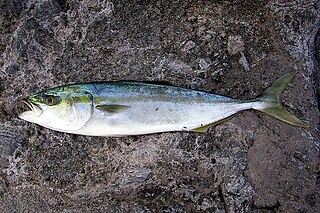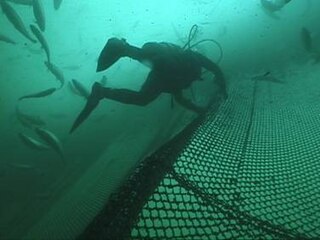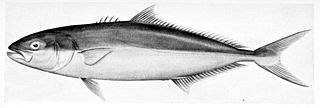
A tuna is a saltwater fish that belongs to the tribe Thunnini, a subgrouping of the Scombridae (mackerel) family. The Thunnini comprise 15 species across five genera, the sizes of which vary greatly, ranging from the bullet tuna up to the Atlantic bluefin tuna. The bluefin averages 2 m (6.6 ft), and is believed to live up to 50 years.

Sashimi is a Japanese delicacy consisting of very fresh raw fish or meat sliced into thin pieces and often eaten with soy sauce.

Fish farming or pisciculture involves raising fish commercially in tanks or enclosures such as fish ponds, usually for food. It is the principal form of aquaculture, while other methods may fall under mariculture. A facility that releases juvenile fish into the wild for recreational fishing or to supplement a species' natural numbers is generally referred to as a fish hatchery. Worldwide, the most important fish species produced in fish farming are carp, tilapia, salmon, and catfish.

The Atlantic bluefin tuna is a species of tuna in the family Scombridae. It is variously known as the northern bluefin tuna, giant bluefin tuna [for individuals exceeding 150 kg (330 lb)], and formerly as the tunny.

The Japanese amberjack or yellowtail, Seriola quinqueradiata, is a species of jack fish in the family Carangidae. It is native to the northwest Pacific Ocean, from Japan to Hawaii.

Tassal is a Tasmanian-based Australian salmon farming company founded in 1986. It has been listed on the Australian Securities Exchange since 2003. Tassal is the largest producer of Tasmanian grown Atlantic salmon in the world, supplying salmon to both domestic and international markets.

The Pacific bluefin tuna is a predatory species of tuna found widely in the northern Pacific Ocean, but it is migratory and also recorded as a visitor to the south Pacific.

China, with one-fifth of the world's population, accounts for one-third of the world's reported fish production and two-thirds of the worlds reported aquaculture production.

Aquaculture started to take off in New Zealand in the 1980s. It is dominated by mussels, oysters and salmon. In 2007, aquaculture generated about NZ$360 million in sales on an area of 7,700 hectares. $240 million was earned in exports.

Aquaculture in Australia is the country's fastest growing primary industry, accounting for 34% of the total gross value of production of seafood. 10 species of fish are farmed in Australia, and production is dominated by southern bluefin tuna, Atlantic salmon and barramundi. Mud crabs have also been cultivated in Australia for many years, sometimes leading to over-exploitation. Traditionally, this aquaculture was limited to pearls, but since the early 1970s, there has been significant research and commercial development of other forms of aquaculture, including finfish, crustaceans, and molluscs.

China, with one-fifth of the world's population, accounts for two-thirds of the world's reported aquaculture production.

Copper alloys are important netting materials in aquaculture. Various other materials including nylon, polyester, polypropylene, polyethylene, plastic-coated welded wire, rubber, patented twine products, and galvanized steel are also used for netting in aquaculture fish enclosures around the world. All of these materials are selected for a variety of reasons, including design feasibility, material strength, cost, and corrosion resistance.

Offshore aquaculture, also known as open ocean aquaculture, is an emerging approach to mariculture or marine farming where fish farms are moved some distance offshore. The farms are positioned in deeper and less sheltered waters, where ocean currents are stronger than they are inshore. Existing ‘offshore’ developments fall mainly into the category of exposed areas rather than fully offshore. As maritime classification society, DNV GL, has stated, development and knowledge-building are needed in several fields for the available deeper water opportunities to be realized.
Dr Hagen Heinz Stehr AO is a German-born multi-millionaire businessman, tuna fisherman and founder of the Stehr Group.

Oceanic Victor is an Australian privately owned company which runs marine tourism facilities on and adjacent to Granite Island, Encounter Bay, South Australia. The company's main attraction is a floating at-sea aquarium containing Southern blue fin tuna and other marine species. The facility is located within a Habitat Protection Zone of the Encounter Marine Park and opened to the public on 2 September 2017.
Clean Seas Seafood Ltd is an Australian seafood production company specialising in the sea-cage aquaculture of Yellowtail kingfish. It was established by The Stehr Group in the year 2000, and became the first Australian company in the sector to be listed on the ASX (2005). The company was established by "tuna baron" Hagen Stehr, whose son Marcus remains one of the company's directors. Its ambition to control and commercialise the lifecycle of the Southern bluefin tuna has not been realised.















